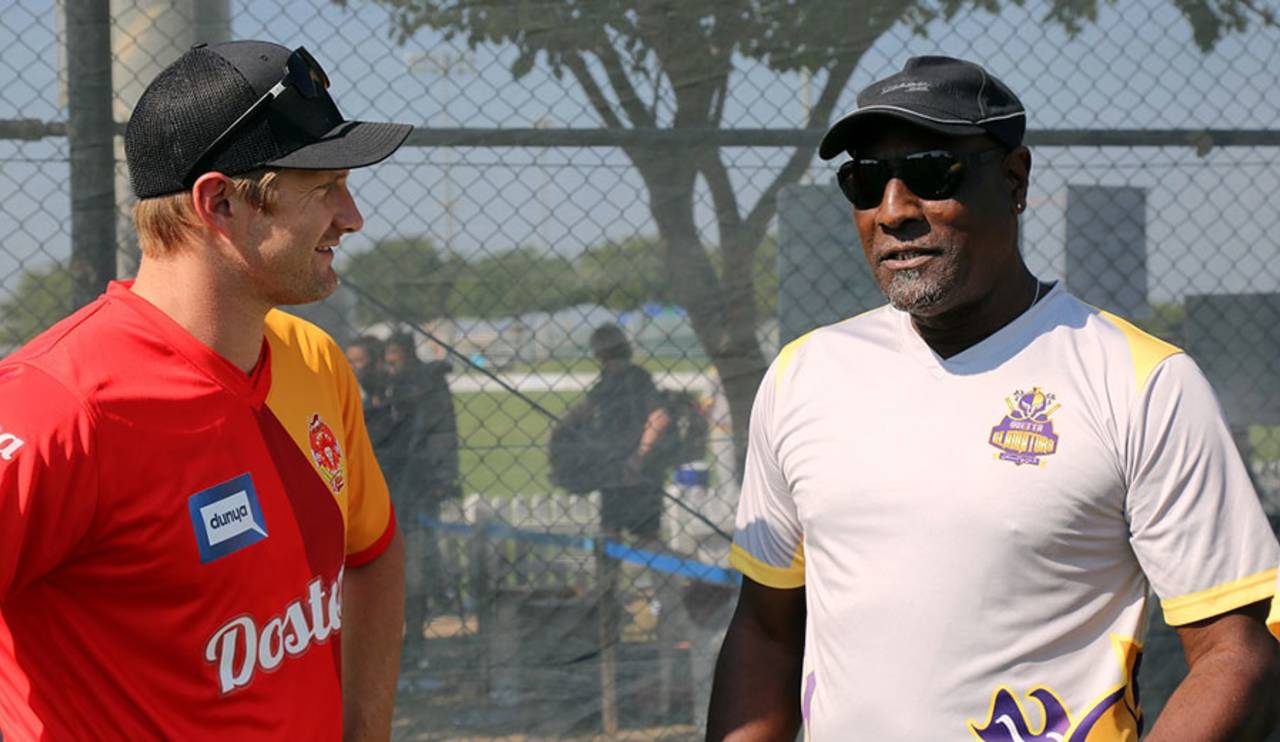Sachin Tendulkar smiles at you as you disembark at the opulent Dubai International airport. As you zip your way through the spacious lanes into downtown, and take in the vertical delights of the Dubai skyline, you notice players featuring in the Masters Champions League (MCL) staring out from the billboards.
You walk through the opulent malls, listen to the morning radio, watch local television, drive in city taxis - nowhere is there a sign, an indication, a banner that tells you that the inaugural Pakistan Super League (PSL) starts on Thursday in Dubai. It is actually starting tomorrow.
The five franchises - Islamabad United, Karachi Kings, Lahore Qalandars, Peshawar Zalmi, Quetta Gladiators have been working hard over the past few days, getting ready for what former Pakistan captain Wasim Akram calls the "biggest thing to happen" in the country's cricket scene.
The outsider will see the PSL as just another league in the conveyer belt of franchise-based Twenty20 competitions that have populated the cricket calendar in the past five years. Yet, for Pakistan the PSL holds a lot of meaning. It is not just about thumping your chest and declaring: Look, we, too, now have a league with global T20 superstars like Chris Gayle, Kevin Pietersen, Shane Watson, Andre Russell and, let us not forget, Shahid Afridi.
It is also, as Afridi says, about "izzat" [prestige], with the cricketing world waiting to see how the PSL performs. According to Afridi, captain of the Peshawar Zalmi franchise, the main reason the PSL is being organised is to see if any new talent emerges: "A new Wasim Akram, a new Waqar Younis, a Javed Miandad, a Shoaib Malik should emerge. That will only be good for Pakistan cricket."
Luckily Pakistan have always been blessed with precocious talent, but that is not enough in modern cricket, especially in T20s where pressure is a constant. That is why the experience of interacting with international players who have been successful in different situations, in tight and big matches, is handy.
"Most Pakistanis say the PSL should be happening in Pakistan, but obviously for unforeseen reasons it is not happening, but the long-term plan is it will," Akram, who has the dual roles of the tournament ambassador and the Islamabad franchise director, says. "But all the young cricketers would be rubbing shoulders with some of the greats of the modern game like Shane Watson, Kevin Pietersen, Chris Gayle, Brad Haddin, Andre Russell, living with them, watching them for 20-odd days, watching their training drills, what is their psyche. All this is not part of our first-class structure. This is a learning curve for the Pakistan youngsters."
The PSL also presents an equal learning opportunity for franchise owners. Akram believes both the league and the franchises will need to be more professional, focusing on the smaller things if the PSL has to grow into a global brand.
"At the moment, things like timings for the matches, the nets are flexible. We should have a chart and we should stick to that," Akram says. "There are little hiccups like not getting the kit on time, not having the caps and small things like that. The PSL said they would make all the kits, but they have taken too much on board. So it is a learning thing for both PSL and the franchises."
The PSL might have missed a trick by not adopting the formula used by the IPL to garner sell-out crowds in the two weeks the Indian league was played in the UAE in 2014. The IPL had to move to the UAE after its schedule clashed with the general elections in India but, as an established league, the tournament created promotional packages, invested in big advertising, organised matches over the weekends and flew in fans from India.
Atmosphere and creating the right kind of noise is an important part of the T20 spectacle. Although the title song for each of the five franchises has a catchy tune, it remains to be seen whether the music will be played to an empty or full house.
Najam Sethi, the PSL chairman, says he had limited budgets and hence could not indulge in marketing as widely and loudly as he would have desired. On ticketing, however, he remains unperturbed. "I would not say it is an obsession with us. We do want as many people to come. We want people to demonstrate their nationalism, their support and affection for the PSL. But to say ticket sales are going to be critical to our financial model is not correct."
Despite all the teething issues and a few embarrassing false starts, the PSL is finally a reality. It is, as Sethi says, ready to take off.
Nagraj Gollapudi is an assistant editor at ESPNcricinfo
